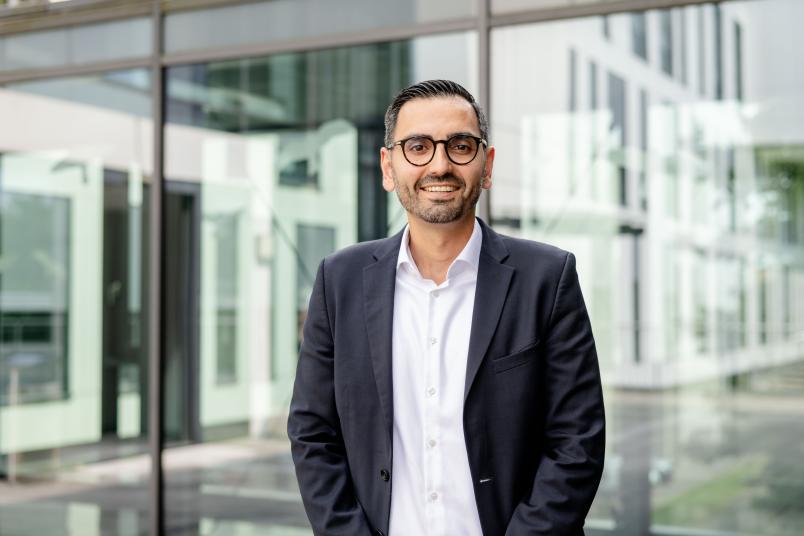
Interview
Taking a Stand against anti-Semitism in Schools
Teachers in Germany are not adequately prepared for the challenges they face at school, according to racism researcher Karim Fereidooni. In our interview, he discusses how things need to change.
Ever since the conflict in the Middle East flared up once again in October 2023, reports of anti-Semitic incidents have been on the rise. This phenomenon does also very much affect schools. In our interview, Professor Karim Fereidooni discusses what can be done to combat anti-Semitism and other forms of racism in classrooms and on school grounds. He holds the professorship for Didactics of Social Sciences Education at Ruhr University Bochum and advises a number of political bodies on how to tackle racism. In March 2024, he was invited to the North Rhine-Westphalia state parliament as an expert on anti-Semitism in schools.
Professor Fereidooni, how does anti-Semitism manifest itself at school?
Since the terrorist attacks by Hamas in October 2023, many Jewish pupils have been afraid to go to school. Some Jewish parents have told me that their children are practising distance learning, just as they did during the coronavirus pandemic.
Anti-Muslim racism and anti-Semitism exist side by side. While Jewish students are perceived as representatives of the Israeli army, are verbally abused and physically attacked, Muslim students quite often find themselves being interrogated. Both groups are seen as proxies – and that’s not acceptable.
In addition to such conscious instances of discrimination, do we also see unconscious anti-Semitism or anti-Muslim racism?
Yes, both do occur. Some people intentionally choose to target Jewish people. Jew has become a slur among school children, even though it’s not. There are also students who believe that all Jewish people are rich. That’s a stereotype; but they don’t realize that it’s discriminatory, because they believe it’s true.

It doesn’t matter what the intention is. It’s the effect that counts.
Still, it doesn’t matter what the intention is. It’s the effect that counts. If I step on your foot without meaning to, you still feel the pain. Discriminatory acts are no different, and we should communicate this to students.
Are teachers to some extent responsible for discrimination, too?
In a study, we observed classes in various subjects for three years and came to the following conclusion: When it comes to Israel or Judaism, teachers are often unable to recognize anti-Semitism or respond to it adequately. Teachers don’t intend to be antisemitic, of course; but they still often reproduce antisemitic tropes by sharing images, jokes or stereotypical depictions of Jewish people.
Such tropes can presumably also be found in textbooks.
Textbooks should contain criticism of anti-Semitism, but this is by no means the case, as we established in a study. As a rule, Judaism is discussed in the context of conflict: the Crusades, the Holocaust, the Middle East. Everyday Jewish or everyday Muslim life is hardly ever mentioned.
What should students do if they feel they’re being discriminated against by a teacher?
It’s important that they don’t feel they’re isolated. They should talk to their classmates and ask how they perceived the situation. They can also involve their parents or student representatives, write to associations or the German Anti-Discrimination Association, where they get free legal advice. There are many places to turn to. I’d also advise anyone affected by these issues to attend empowerment workshops, where they can learn strategies to keep up their physical and mental integrity despite experiencing discrimination.
What can we do to improve the situation?
As educational scientists, we have a duty to prepare teachers for the challenges they’ll face in schools. We don’t talk enough in teacher training about anti-democracy and inequality structures such as anti-Semitism, racism and hostility towards LGBTQ+ people. Teachers are not taught the skills they need to respond adequately to discriminatory comments.
I’d like to see something that’s simple and yet complicated: a change to the teacher training law in North Rhine-Westphalia. This would force us to broach the subject of anti-democracy and inequality with students.
Is this something to be discussed primarily in history and politics classes?
Democratic competence is an interdisciplinary competence. I wouldn’t say that politics or history teachers are particularly called on to tackle it. Schools and teachers in general are role models. No matter which subject they teach. We need to educate all teachers to be articulate on this issue.
In your opinion, what are the three most important measures to prevent anti-Semitism and other forms of racism in the classroom?
First, we need properly trained teachers. Teachers should also be open to the fact that there are other realities of life than their own: Just because someone doesn’t experience anti-Semitism or anti-Muslim racism doesn’t mean that it doesn’t exist.
Moreover, schools should develop institutional measures to combat hostility towards other people in general. They could, for example, set up a network dedicated to the critique of racism, in order to examine together with students how Jewish, Muslim or black people are portrayed in textbooks. If the portrayals are fed by stereotypes, they should create their own teaching materials. Or set up an anti-discrimination office. This is something many schools are already doing.